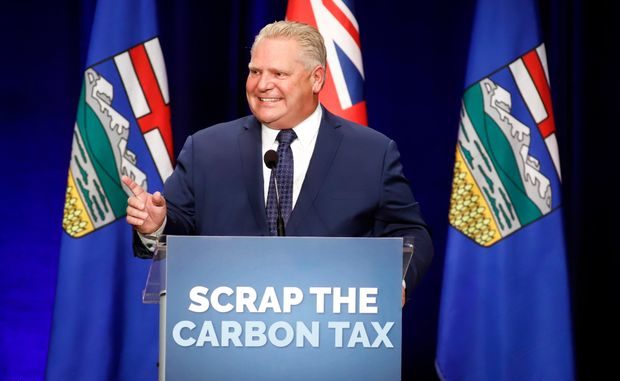
Costs of Living to Increase with Federal Tax in Effect April 1
SCARBOROUGH — Ontario’s government is working for the people by fighting against increased living costs caused by the imposition of a burdensome federal carbon tax.
Raymond Cho, Minister for Seniors and Accessibility, and Rod Phillips, Minister of the Environment, Conservation and Parks, met with two Ontario seniors today to talk about how the federal government’s carbon tax will impact their household costs.
“We know that the federal carbon tax will increase the cost to heat your home, fuel your car and feed your family, and we know that these added costs will especially impact vulnerable populations, such as seniors,” said Minister Phillips. “More than this, the carbon tax will have an effect on the institutions that provide essential and life-saving services to seniors, including hospitals, nursing homes and retirement homes.”
This is the second day with the carbon tax and the financial burden is already making an impact on seniors’ pocketbooks, seniors’ centres and other essential services that seniors across the province rely upon. It will cost a typical household an extra $258 a year in 2019 and this will rise to $648 by 2022. This will put additional financial pressure on seniors, many of whom have already said they do not feel prepared for retirement and worry about living on a fixed income. This money could be better spent on meeting daily needs such as housing and buying food.
“Many seniors in Ontario live on a fixed income and every dollar counts,” said Minister Cho. “Adding any additional costs to seniors’ pocketbooks will affect their daily budgets and impact their ability to live active and engaged lives.”
Higher heating costs due to the federal carbon tax will also have an impact on Ontario’s seniors’ centres and organizations that offer many of the support services older adults require to remain active and socially engaged in their communities. Additionally, the cost of operating the approximately 750 retirement homes, which are home to over 55,000 seniors in Ontario, may increase, and further put a strain on older adults’ ability to choose where they want to live.
The Made-in-Ontario Environment Plan considers our province’s specific priorities, challenges and opportunities, and commits to reducing our emissions to 30 per cent below 2005 levels by 2030, a target that aligns with the federal government’s Paris commitments, without imposing a carbon tax on the vulnerable groups in our province. Through the efforts of individuals and industry, Ontario is already most of the way to this target, with the province’s emissions down 22 per cent since 2005.
“Our plan serves as proof that you can both oppose a carbon tax and continue to do more to fight climate change – you don’t have to choose,” concluded Minister Phillips. “Ontario deserves both a healthy environment and a healthy economy.”
The government remains committed to fighting the federal government’s plan to impose a carbon tax on the people of Ontario.
Quick Facts
- Low income among seniors is rising. Since the mid-1990s, seniors’ low-income rates have moved steadily higher to 12.1 per cent in 2017.
- Incidence of low income amongst single seniors has risen steadily from 2.9 per cent in 1992 to 30.5 per cent in 2017.
- Starting January 1, 2019, the federal government’s output-based pricing system for large emitters came into force.
- The federal carbon tax on fuels came into effect on April 1, 2019. It will increase the price of gasoline in Ontario by 4.4 cents per litre. This will rise to 6.6 cents in 2020, 8.8 cents in 2021, and 11.1 cents per litre in April 2022.
- The federal carbon tax will increase the price of natural gas in Ontario by 3.9 cents per cubic metre. This increase will rise to 5.9 cents in 2020, 7.8 cents in 2021, and 9.8 cents per cubic metre in April 2022.
- The federal carbon tax will increase the price of diesel by 5.4 cents per litre in 2019, rising to 13.4 cents by 2022.
- The federal carbon tax will also increase annual heating costs for nursing and seniors’ care homes by $6.7 million in 2019, rising to $16.7 million in 2022. This means an average cost increase of $9,000 per senior centre by 2019, and $22,000 by 2022.
- Ontario is part of a coalition of provinces pledged to fight the federal government’s unconstitutional carbon tax. Saskatchewan and New Brunswick have joined Ontario’s challenge to the federal government’s Greenhouse Gas Pollution Pricing Act, which is an unconstitutional, disguised tax. Ontario’s case challenging the constitutionality of the federal carbon tax will be heard by the Court of Appeal from April 15 to 18, 2019.
- As outlined in Ontario’s environment plan, the province is committed to meeting its share of Canada’s 2030 target while recognizing the unique circumstances of our economy. From 2005 to 2016, Ontario reduced its emissions by about 22 per cent.
- The Made-in-Ontario Environment Plan commits to reducing our province’s emissions output to 30 per cent below 2005 levels by 2030 without imposing a carbon tax.

Leave a Reply